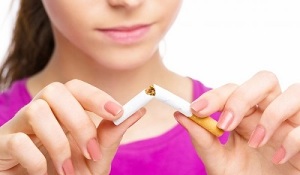
In the process of quitting bad habits, the main thing is not to overdo it with goal setting and goal actualization. Very few are able to quit smoking here now once and for all. This is a long-term process with its own kickbacks and experiences. All this is connected with emotional, psychological and physiological characteristics. You can quit smoking on your own, but you need to do it correctly, reasonably, gradually.
Let's try to figure out all the twists and turns in this important but not easy matter. Experts have developed a formula for success for a person quitting an addiction, in the form of a calendar or graph with a detailed description of the changes taking place in the body. I wonder what happens to the body when you quit smoking. Let's try to figure it out.
Important: the consequences for the body by day
During the transition to a healthy lifestyle, significant clinical changes occur in the body of an adult (heavy smoker), the emotional background and physiological state change. Each new day of quitting smoking differs from the previous one against the background of psychological problems and physical well-being. As they say, the main thing at this time is not to break. So, we will present a picture of what is happening in the form of a diary, in which a number of calendar days are noted and given with a description of the current symptoms.
Quitting Smoking: Day One
When, finally, the decision to quit smoking has been made finally and irrevocably (albeit not for the first time), it is necessary to "enter" this process gradually. To facilitate the transition from an unhealthy lifestyle to a healthy one, it is important to know how the body will behave. On the first day of the "course" of a healthy lifestyle, the weakened body needs to get used to a new regime for itself and start the recovery processes. A sudden transition from one state to another can adversely affect overall well-being and reduce resolve. This is not only a physical but also a psychological test.
The main thing that happens to the body when you quit smoking: the amount of carbon monoxide decreases, the transport of red blood cells improves, more oxygen enters the tissues. Even outwardly, on the first day after quitting nicotine, the “former” smoker enjoys a new state for himself, he is more active, cheerful, confident in his own strength. The very ability to painlessly give up the habit of smoking on the first day of the course convinces the heavy smoker of determination and willpower. And this is important in overcoming nicotine cravings.
However, do not forget that on the first day, characteristic physiological changes begin in the body.
For example, what happens in a woman's body:
- slight dizziness,
- lack of appetite,
- weakness,
- anxiety,
- sleep disorders,
- insomnia.

What is the reason? An experienced smoker subjects his body to tests at the emotional-psychological level and at the physiological level. Such deep processes are triggered that the body “cannot live” without nicotine.
Quitting the cigarette triggers other dramatic changes. Nicotine is not simply absorbed into the bloodstream, but begins to affect the blood flow. Therefore, it is important to take into account that, in general, the body will need at least a year to recover from quitting smoking. But for now, back to the quit smoking diary.
Do not forget that on the first day of quitting smoking, characteristic physiological changes begin in the body, for example, women experience slight dizziness.
Quitting Smoking: Day Two
At this time, decisiveness can let you down a little - attacks will begin to return to the old habit (at least not for a long time). Here's what happens in a man's body, for example. While the struggle is taking place on an emotional level, the body is undergoing no less dramatic changes: the respiratory organs are freed from mucus and settling components, the functions of the ciliated epithelium are restored, the state of the gastrointestinal tract improves, new cells appear in the tissues. The changes occurring during this period at the emotional level are manifested in the form of euphoria, emotional excitability. But irritability can also appear. It all depends on self-hypnosis and self-discipline. Although sometimes drowsiness can be abruptly replaced by energy. On the second day after quitting smoking, the appetite has not yet been completely restored (strange taste sensations may occur). You may also experience shortness of breath, cough, and even stomach pain. During this period, urges to urinate and difficulty falling asleep are more often manifested. If you add to this the nervous tension, for example, as a result of stress at work, then it is quite natural that itching on the skin.
Smoking cessation: days three and four
Let's consider further what happens to the body when you quit smoking. A set of factors affects how soon the body will recover. In particular, the general condition and weakened immunity play a special role. Therefore, the nuances of smoking cessation therapy should be judged at the cellular level. Each person has his own supply of internal energy to fight the addiction. Accordingly, an individual approach is needed. During the cleansing process, the body gets rid of toxins. Even the structure of the cells changes to trigger a radical cleaning.
This is what happens to the body these days:
- restoration of ciliated epithelium on the tissues of the respiratory organs,
- in the pancreas the indicator of alkaline fractions increases,
- less mucus accumulates in the stomach,
- In general, blood circulation in the heart and brain improves.
A clear unwillingness to smoke begins to appear, peristalsis is normalized. At the same time, the ex-smoker's “withdrawal” increases, which has more psychological implications, nervousness appears. Quitting smoking as if “does not find a place for himself”, struggling with a long-term habit. Against this background, there is an increased appetite, "seizing" sweets. Sometimes the skin begins to peel off and the fingers swell. When coughing, phlegm may appear in the throat.
Quitting Smoking: Day Five and Six
In the process of "quitting" smoking, many people use a special table or calendar for convenience, someone keeps a diary, recording their feelings in detail. This is useful when you need to identify associated symptoms and changes in the body. As it gets easier after a few days, a diary will help you hold back and analyze your mistakes. From the fifth to the seventh day, a former smoker notices the following changes in his body: it is noticeable how microtraumas on the skin began to heal faster; all segments of the respiratory system (and the most distant ones too) are restored; digestion returns to normal; at an invisible level, the blood cells are cleared of nicotine.

Usually, the final point in the process of fighting the addiction is set on the seventh day, when a person's physical addiction to cigarettes (smoke, smell) disappears. At the same time, there is no feeling of psychological discomfort. But don't forget about the likelihood of relapse. Disruptions do happen anyway. When euphoria passes, nervousness and aggression appear. Even sleep problems may appear again. However, it is important to remember that this is not for long, that the main stage in life - quitting smoking - has been completed successfully and there is no motivation to return to the old life.
In the process of "quitting" smoking, many people use a special table or calendar for convenience, someone keeps a diary, recording their feelings in detail.
Quitting Smoking: Week Two
After a week, it seems that the Rubicon has been passed and now you can live like non-smokers, calmly engaging in everyday worries. But that rarely happens. The body certainly made a major leap in the first week of quitting smoking. Nevertheless, sometimes even external factors (the smoke of cigarettes and even their appearance, for example, when they smoke nearby) can play a bad joke with a former smoker. Therefore, it is worth sharing about your plans with friends and acquaintances, so that there is no temptation to break off "for the company".
It is worth listening to your body at this moment, it probably has already managed to wean itself from nicotine. But this is not the end of the process of restoring the body from nicotine addiction. You can help yourself by flipping through the calendar of a former smoker, seeing obvious shifts in work on yourself. It turns out that, starting from the second week, the struggle turns into a purely psychological plane. The desire to smoke can arise during stress, sadness, at the sight of an active smoker at his work. One must learn not to react to such external promises of a return to the past.
What happens by the end of the second week?
It has been 14 days since a former smoker has been abstaining from nicotine addiction. By this time, the following changes in his body can be noted: the healing of bronchitis and the renewal of platelets. Although the renewal of red blood cells has not yet taken place. This may be due to vegetative-vascular manifestations. At the same time, you can notice how the complexion improves, the yellowish tint of the fingers disappears, and the acute cough gradually disappears. The longer the smoker's experience, the longer the symptoms will appear.
What happens in the first month of quitting smoking?
On the 30th day of giving up cigarettes, weight begins to decrease, the upper respiratory tract system is fully restored, and psychological comfort is felt. At the same time, enthusiasm can be replaced by depression or blues. Here again, as in the first week, it is important not to break loose, to hold on, because the most difficult way to quit smoking has already been passed.
What happens from the second month of quitting smoking?
Starting from the second month of the recovery process from nicotine addiction, and for the next three to four months, the former smoker (this is especially noticeable in women) acquires more pleasant facial features, puffiness subsides, and the grayish tint on the face disappears, as well as couperose nets. And in the third month, an intensive restoration of blood vessels occurs in the body. This indicates that the tone of the body is finally returning to normal, as well as the fact that the "point of no return" has finally passed. The physical craving for tobacco has weakened so much that one can calmly perceive another smoker next to him, without experiencing torment. In general, there are noticeable improvements on the emotional, psychological and physical level. Good appetite is no longer a sign of stress seizure, but simply associated with well-being.
What happens by the first year after quitting smoking?
Now let's look at what happens to the body when you quit smoking in the long term. Six months is an important milestone. At this stage of life, doctors note the complete renewal of all body systems, when the blood and cells are almost completely rid of the toxic substance (nicotine). It seems that every new day it becomes easier to breathe. The lungs really work more efficiently. A year is already a real experience of a former smoker. This is the period when the first serious results can be summed up. For example, you can congratulate yourself on the successful end of the event and just enjoy a nicotine-free life, which will certainly bear fruit. Those who quit smoking reduce the risk of heart attack and stroke by 30-50 percent; lung cancer - by 80 percent; problems with the gastrointestinal tract - by 70 percent.
Willpower, or alternatives
Many people who quit smoking have a false sense of how easy it is to achieve a goal by substituting one habit for another. But any psychoactive substance provokes cravings for other addictions. Someone switches to light cigarettes, someone continues to smoke a pack of cigarettes, simply stretching it out in time. Of course, smokers with twenty years of experience can find it more difficult than others. In this case, smoking cessation is cyclical, not abrupt. In any case, only a person himself can free himself to freedom, giving up just one habit.

























